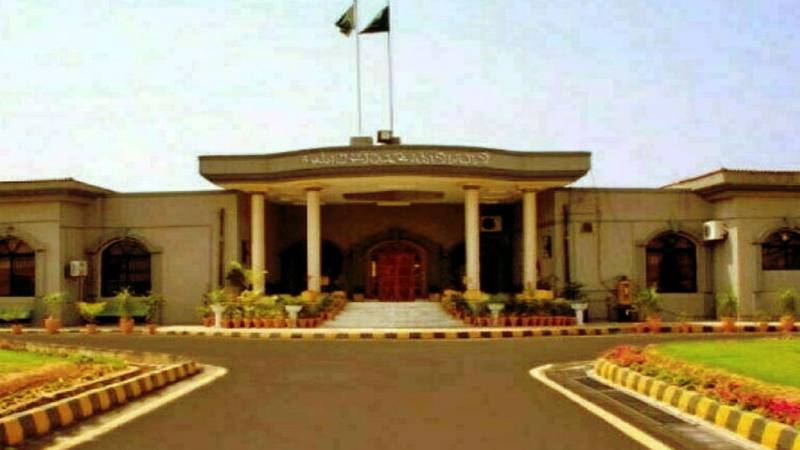
Five Islamabad High Court (IHC) judges said on Friday that if the purpose of transferring a judge from the Lahore High Court (LHC) is to have the transferred judge considered for the position of chief justice, then this constitutes a fraud on the constitution.
The five judges of the IHC expressed this stance in a five-page letter to Chief Justice of Pakistan (CJP) Yahya Afridi. The letter opposing any transfer of judges to the IHC was also sent to the President of Pakistan and the Chief Justices of other high courts.
The letter was signed by the senior-most judge of the IHC, Justice Mohsin Akhtar Kayani, and Justices Babar Sattar, Tariq Mehmood Jahangiri, Sardar Ijaz Khan, and Saman Rafat Imtiaz. The names of Justices Miangul Hassan Aurangzeb and Arbab Muhammad Tahir are mentioned in the letter, but these two justices did not sign it.
"We urge you not to advise the President to undertake any such transfer," the IHC judges stated in their joint letter, citing seven reasons.
The judges emphasized that under the current constitutional framework, there is no provision for a unified federal judicial service in Pakistan. "The High Courts are independent and autonomous," they added. The judges also pointed out that justices who are elevated to a particular High Court take an oath under Article 194 of the Constitution with respect to a specific province.
"Since the passage of the Eighteenth Amendment in 2010, and during the tenure of political democratic governments in Pakistan, there has been no precedent of permanent appointments to the High Courts through the invocation of Article 200 of the Constitution," the letter stated.
The letter further noted that the 26th Amendment had not institutionalized the mechanism of transferring judges between High Courts, as had been proposed in drafts of the amendment. "Proposals were made where the consent requirement of the judge and the consultation requirement with the Chief Justice of Pakistan and the Chief Justices of the relevant courts were suggested to be dispensed with."
Despite significant changes in the judicial framework under the 26th Amendment, the legislature did not constitutionalize permanent transfers as envisioned in the proposal. The judges clarified that Article 200 was not amended, and the conception of each court being separate and autonomous under the system of federalism remained intact.
The judges also stated that the purported purpose of the transfer from the LHC was to position the transferred judge as a candidate for the Chief Justice of the IHC. "This cannot be under the Constitution," they asserted.
The letter further clarified that a transferred judge would need to take a fresh oath under Article 194 for serving in a new High Court. "His seniority would be determined from the date of the oath taken for the purposes of serving at the Islamabad High Court," the judges pointed out. "The Supreme Court has already held that seniority is determined from the date the oath is taken for a specific High Court."
The judges noted that if the 26th Amendment had accepted the proposed Article 200(1A), it could have facilitated such transfers. However, since the legislature did not approve that provision, a transferred judge would be placed at the bottom of the seniority list at the date of the transfer, even if they had served at another High Court.
This situation could be unfortunate for the transferred judge and may lead to friction, potentially jeopardizing the smooth functioning of the Court," the judges warned.
Once appointed to a High Court under the Constitution, the three senior-most justices of that High Court are to be considered for the position of Chief Justice. "It defeats the purpose of the Constitution and the 2024 Appointment Rules if a judge, otherwise lower in seniority in another High Court, is then transferred and considered for the Chief Justice position," the letter stated.
The judges argued that the transfer of a judge for the purpose of appointing them as Chief Justice would undermine the independence of the judiciary. "It would allow for control over a High Court by a judge foreign to that Court," they explained. "This would set perverse incentives for judges, encouraging ingratiation."
The judges also pointed out that the transfer process could not be justified by the vacancies in the Islamabad High Court. "There are already ten judges serving in the IHC, out of an available twelve, meaning 83.33% of the slots are occupied," they observed. "Meanwhile, the Lahore High Court has a significant shortfall, with only 35 out of 60 judges currently serving."
Furthermore, the judges noted that the number of pending cases in the Islamabad High Court was significantly lower than in the Lahore High Court. "As of June 2024, there were 197,875 pending cases in the Lahore High Court, compared to 16,993 in the Islamabad High Court."
In conclusion, the judges stated that there was no public interest that would justify the transfer. They urged the CJP Afridi to ensure that, during consultations with the President, it be clearly conveyed that such a transfer would be unconstitutional, detrimental to judicial independence, and unjustifiable.
According to Hafiz Ehsaan Ahmad Khokhar, a Supreme Court attorney and constitutional expert, Article 200 of the Constitution outlines the procedure for transferring a judge between High Courts. He explained that no transfer can occur without the judge's consent, and the President must consult with the Chief Justice of Pakistan and the Chief Justices of both High Courts.
Khokhar also pointed out that while a Chief Justice may suggest a transfer for administrative reasons, only the President can formally execute the transfer after consulting the relevant parties. He acknowledged that although the judges of the IHC have raised their concerns, the process could still proceed if all constitutional offices involved in the decision-making process agree to the transfer.

